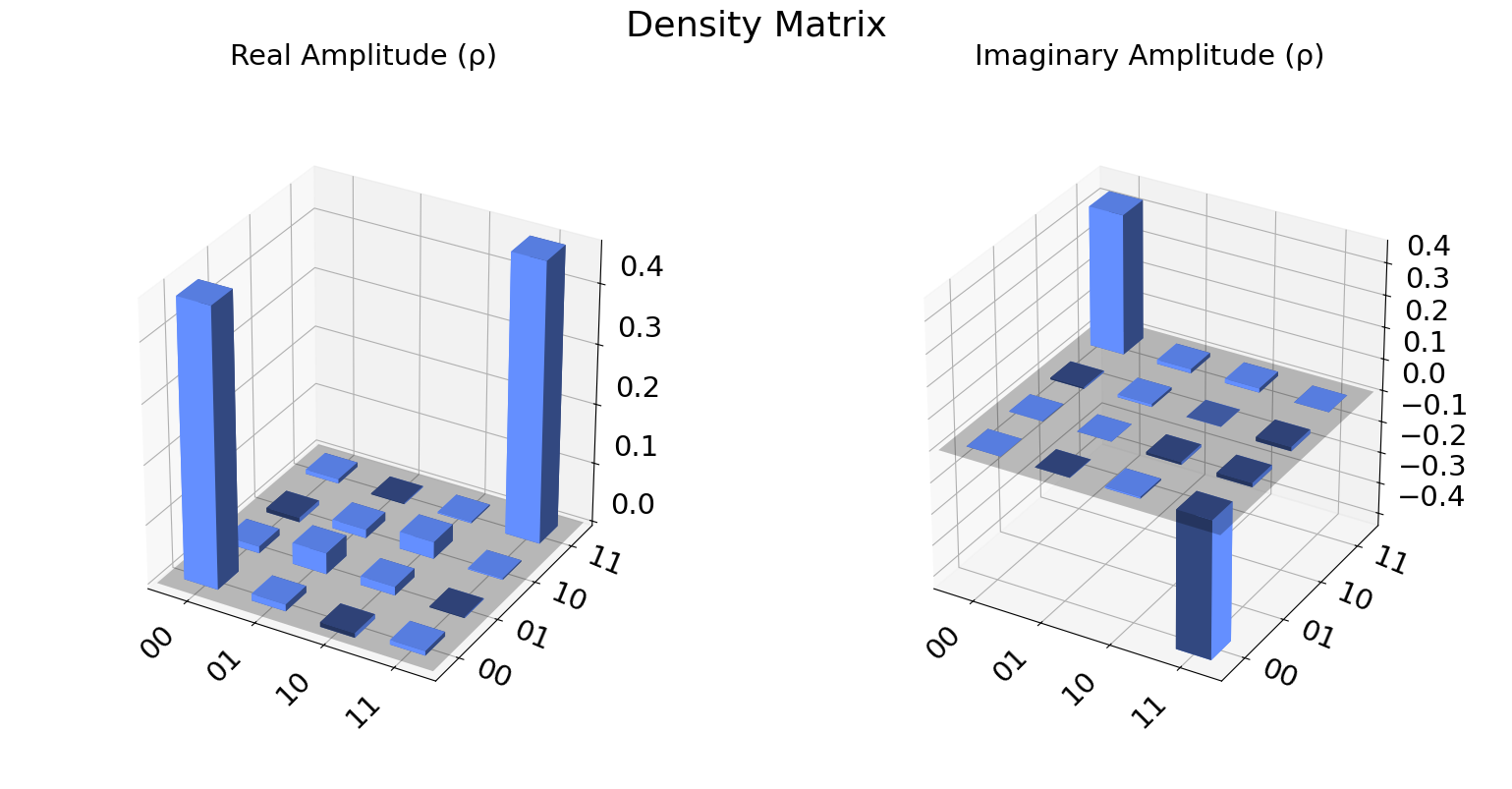Note
This is the documentation for the current state of the development branch of Qiskit Experiments. The documentation or APIs here can change prior to being released.
StateTomography¶
- class StateTomography(circuit, backend=None, physical_qubits=None, measurement_basis=<PauliMeasurementBasis: PauliMeasurementBasis>, measurement_indices=None, basis_indices=None, conditional_circuit_clbits=False, analysis='default', target='default')[source]¶
An experiment to reconstruct the quantum state from measurement data.
Overview
Quantum state tomography (QST) is a method for experimentally reconstructing the quantum state from measurement data.
A QST experiment measures the state prepared by quantum circuit in different measurement bases and post-processes the measurement data to reconstruct the state.
User manual
Analysis class reference
Experiment options
These options can be set by the
set_experiment_options()method.- Options
Defined in the class
TomographyExperiment:basis_indices (Iterable[Tuple[List[int], List[int]]])
Default value:NoneThe basis elements to be measured. If None All basis elements will be measured.
Defined in the class
BaseExperiment:max_circuits (Optional[int])
Default value:NoneThe maximum number of circuits per job when running an experiment on a backend.
Example
from qiskit import QuantumCircuit from qiskit_experiments.library import StateTomography from qiskit.visualization import plot_state_city nq = 2 qc_ghz = QuantumCircuit(nq) qc_ghz.h(0) qc_ghz.s(0) for i in range(1, nq): qc_ghz.cx(0, i) qstexp = StateTomography(qc_ghz) qstdata = qstexp.run(backend=backend, shots=1000, seed_simulator=100,).block_for_results() state_result = qstdata.analysis_results("state", dataframe=True).iloc[0] plot_state_city(state_result.value, title="Density Matrix")

Note
Performing full state tomography on an N-qubit state requires running \(3^N\) measurement circuits when using the default measurement basis.
See also
Initialization
Initialize a quantum process tomography experiment.
- Parameters:
circuit (QuantumCircuit | Instruction | BaseOperator | Statevector) – the quantum process circuit. If not a quantum circuit it must be a class that can be appended to a quantum circuit.
backend (Backend | None) – The backend to run the experiment on.
physical_qubits (Sequence[int] | None) – Optional, the physical qubits for the initial state circuit. If None this will be qubits [0, N) for an N-qubit circuit.
measurement_basis (MeasurementBasis) – Tomography basis for measurements. If not specified the default basis is the
PauliMeasurementBasis.measurement_indices (Sequence[int] | None) – Optional, the physical_qubits indices to be measured. If None all circuit physical qubits will be measured.
basis_indices (Sequence[list[int]] | None) – Optional, a list of basis indices for generating partial tomography measurement data. Each item should be given as a list of measurement basis configurations
[m[0], m[1], ...]wherem[i]is the measurement basis index for qubit-i. If not specified full tomography for all indices of the measurement basis will be performed.conditional_circuit_clbits (bool | Sequence[int] | Sequence[Clbit]) – Optional, the clbits in the source circuit to be conditioned on when reconstructing the state. If True all circuit clbits will be conditioned on. Enabling this will return a list of reconstructed state components conditional on the values of these clbit values.
analysis (BaseAnalysis | None | str) – Optional, a custom analysis instance to use. If
"default"StateTomographyAnalysiswill be used. If None no analysis instance will be set.target (Statevector | DensityMatrix | None | str) – Optional, a custom quantum state target for computing the state fidelity of the fitted density matrix during analysis. If “default” the state will be inferred from the input circuit if it contains no classical instructions.
Attributes
- analysis¶
Return the analysis instance for the experiment
- backend¶
Return the backend for the experiment
- experiment_options¶
Return the options for the experiment.
- experiment_type¶
Return experiment type.
- num_qubits¶
Return the number of qubits for the experiment.
- physical_qubits¶
Return the device qubits for the experiment.
Methods
- circuits()¶
Return a list of experiment circuits.
- Returns:
A list of
QuantumCircuit.
Note
These circuits should be on qubits
[0, .., N-1]for an N-qubit experiment. The circuits mapped to physical qubits are obtained via the internal_transpiled_circuits()method.
- config()¶
Return the config dataclass for this experiment
- Return type:
- copy()¶
Return a copy of the experiment
- Return type:
- classmethod from_config(config)¶
Initialize an experiment from experiment config
- Return type:
- job_info(backend=None)¶
Get information about job distribution for the experiment on a specific backend.
- Parameters:
backend (Backend) – Optional, the backend for which to get job distribution information. If not specified, the experiment must already have a set backend.
- Returns:
A dictionary containing information about job distribution.
”Total number of circuits in the experiment”: Total number of circuits in the experiment.
”Maximum number of circuits per job”: Maximum number of circuits in one job based on backend and experiment settings.
”Total number of jobs”: Number of jobs needed to run this experiment on the currently set backend.
- Return type:
dict
- Raises:
QiskitError – if backend is not specified.
- run(backend=None, sampler=None, analysis='default', timeout=None, backend_run=None, **run_options)¶
Run an experiment and perform analysis.
- Parameters:
backend (Backend | None) – Optional, the backend to run on. Will override existing backend settings.
sampler (BaseSamplerV2 | None) – Optional, the sampler to run the experiment on. If None then a sampler will be invoked from previously set backend
analysis (BaseAnalysis | None) – Optional, a custom analysis instance to use for performing analysis. If None analysis will not be run. If
"default"the experimentsanalysis()instance will be used if it contains one.timeout (float | None) – Time to wait for experiment jobs to finish running before cancelling.
backend_run (bool | None) – Use backend run (temp option for testing)
run_options – backend runtime options used for circuit execution.
- Returns:
The experiment data object.
- Raises:
QiskitError – If experiment is run with an incompatible existing ExperimentData container.
- Return type:
- set_experiment_options(**fields)¶
Set the experiment options.
- Parameters:
fields – The fields to update the options
- Raises:
AttributeError – If the field passed in is not a supported options
- set_run_options(**fields)¶
Set options values for the experiment
run()method.- Parameters:
fields – The fields to update the options
See also
The Setting options for your experiment guide for code example.
- set_transpile_options(**fields)¶
Set the transpiler options for
run()method.- Parameters:
fields – The fields to update the options
- Raises:
QiskitError – If initial_layout is one of the fields.
See also
The Setting options for your experiment guide for code example.